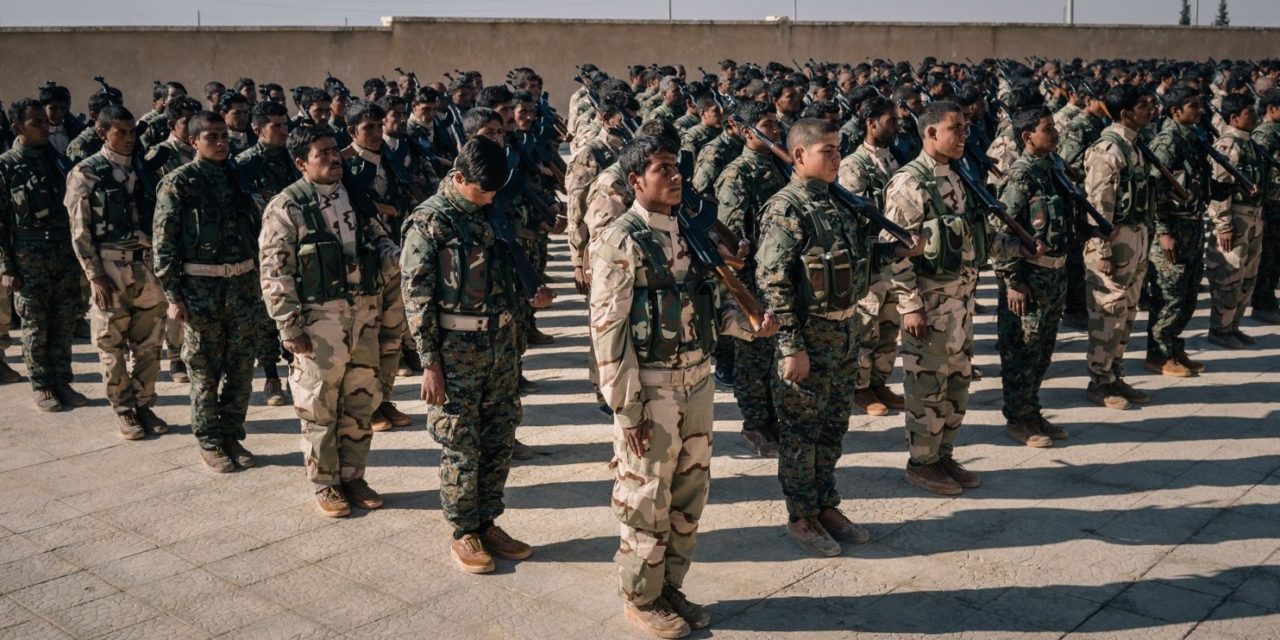PHOTO: Kurdish YPG militia at a graduation ceremony, after completing military training provided by US Special Forces, in Syria’s Aleppo Province (Alice Martins/Washington Post)
Liz Sly writes for The Washington Post about the Kurdish militia YPG, now the focus of US policy and support, because of Washington’s priority of fighting the Islamic State rather than confronting the Assad regime:
In a former high school classroom in this northeastern Syrian town, about 250 Arab recruits for the U.S.-backed war against the Islamic State were being prepped by Kurdish instructors to receive military training from American troops.
Most of the recruits were from villages surrounding the Islamic State’s self-proclaimed capital of Raqqa, and the expectation is that they will be deployed to the battle for the predominantly Arab city, which is now the main target of the U.S. military effort in Syria.
But first, said the instructors, the recruits must learn and embrace the ideology of Abdullah Ocalan, a Kurdish leader jailed in Turkey whose group is branded a terrorist organization by both Washington and Ankara.
The scene in the classroom captured some of the complexity of the US-backed fight against the Islamic State in Syria, where a Kurdish movement that subscribes to an ideology at odds with stated US policy has become America’s closest ally against the extremists.
The People’s Protection Units, or YPG, is the military wing of a political movement that has been governing northeastern Syria for the past 4 1 / 2 years, seeking to apply the Marxist-inspired visions of Ocalan to the majority Kurdish areas vacated by the Syrian government during the war.
Over the past two years, the YPG has forged an increasingly close relationship with the United States, steadily capturing land from the Islamic State with the help of US airstrikes, military assistance and hundreds of U.S. military advisers.
The gains have taken Kurdish fighters far beyond traditionally Kurdish areas into territory populated overwhelmingly by Arabs, threatening not only to stir up long-standing ethnic rivalries but also a wider conflict.
Turkey, which regards the YPG as an affiliate of Ocalan’s Kurdistan Workers’ Party, or PKK, is enraged at the U.S. support for the Syrian Kurds, and this month called on President-elect Donald Trump to sever U.S. support for the militia when he takes office. As Russia, Syria and Turkey move closer toward a settlement to the overall Syrian conflict, the United States could also find itself at odds with Russia over its military role in Syria.
To assuage Turkish concerns and avert tensions between Arabs and Kurds, the U.S. military is channeling weapons and ammunition to an umbrella organization called the Syrian Democratic Forces (SDF), which includes Arab fighters as well as the Kurds. The goal, the U.S. military says, is to build an Arab force capable of taking and holding Arab cities such as Raqqa, thereby diluting the influence of the Kurdish fighters.
U.S. officials and military advisers in Syria declined to discuss details of the training being provided to the Arabs in the force. But they said they were unaware that the Arab recruits were receiving lessons in Kurdish political theory before their U.S. military training. “What happens to them before they come to us, we don’t know,” said one of the U.S. military advisers in Syria, who spoke on the condition that he not be identified by name or rank.

